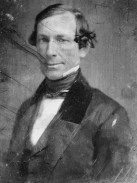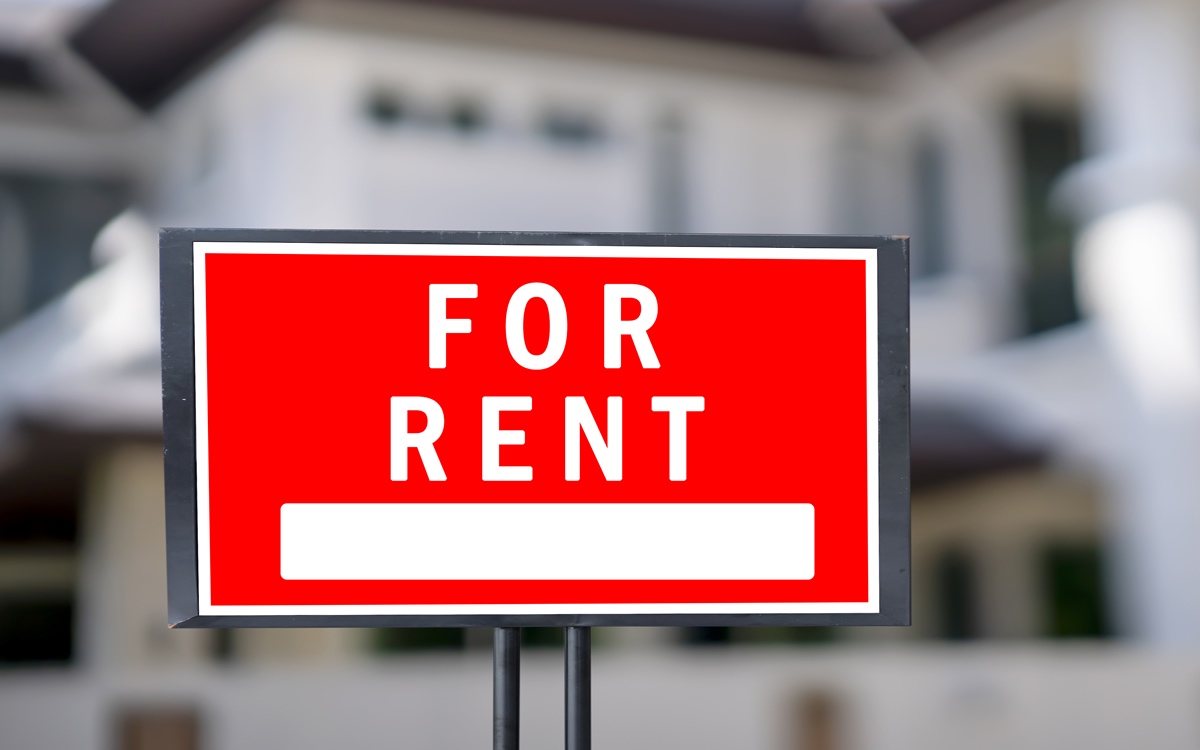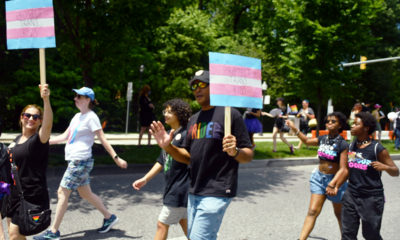Living
America’s first gay vice president?
‘Lifelong bachelor’ William Rufus King lived with President Buchanan

Editor’s note: This is the first installment in a month-long series profiling prominent figures in American history who were gay (or rumored to be) as part of the National Gay History Project commemorating LGBT History Month. For more coverage, visit washingtonblade.com.
William Rufus DeVane King, the 13th United States vice president, has the distinction of having served in that office for less time than any other vice president.
He died of tuberculosis on April 18, 1853, just 25 days after being sworn into office on March 24, 1853, according an official biography of King prepared by the Office of the Historian of the U.S. Senate.
Other historians have speculated that King holds yet another distinction — the likely status of being the first gay U.S. vice president and possibly one of the first gay members of the U.S. House of Representatives and the U.S. Senate.

William Rufus DeVane King, the 13th United States vice president, is believed by some historians to have been gay. He holds the distinction of being sworn into office on foreign soil, while in Cuba for health reasons.
King (1786-1853) served in the House of Representatives from North Carolina for six years beginning in 1811 and later served in the Senate from the newly created state of Alabama from 1819-44, when he became U.S. minister to France.
He returned to the Senate four years later, in 1848, where he served until December 1852, when he resigned after winning election in November 1852 as vice president on the ticket of Franklin Pierce.
A lifelong bachelor, King lived for 15 years in the home of future U.S. president James Buchanan while the two served in the Senate. Buchanan, also a lifelong bachelor, is believed by some historians to be the nation’s first gay president.
“They certainly didn’t have the word gay back then,” said Paul F. Boller Jr., professor emeritus of history at Texas Christian University and author of several books on presidential politics, including the book “Presidential Campaigns: From George Washington to George W. Bush.”
In a telephone interview, Boller said Washington insiders at the time speculated over whether King and Buchanan’s well-known close friendship had evolved into a romantic relationship.
“I don’t think the word homosexual was used either,” Boller said. “So they’d sort of use the term ‘a little feminine’ and all of that.”
Boller and historian Jean H. Baker, professor of history at Maryland’s Goucher College and author of a biography of Buchanan, each cite reports that President Andrew Jackson referred to King as “Miss Nancy” and “Aunt Fancy.” Aaron V. Brown, who became U.S. postmaster general while Buchanan was president, reportedly referred to King as Buchanan’s “wife.”
Baker reports in her Buchanan biography that King’s and Buchanan’s nieces reportedly destroyed their uncles’ correspondence with each other, fueling speculation that the two men were in a gay relationship that their families wanted to conceal.
In one letter that survived, Buchanan expressed sadness over King’s departure from his house in 1844 to become the U.S. envoy to France.
“I am now solitary and alone, having no companion in the house with me,” Buchanan wrote. “I have gone a wooing to several gentlemen, but have not succeeded with any one of them.”
King’s relationship with Buchanan, who was from Pennsylvania, could have been a factor in Buchanan’s sympathy for the South during Buchanan’s tenure as a senator and later as president from 1857-61.
Most accounts by historians of King’s political career portray him as a moderate southerner who supported slavery while emerging as a strong unionist. King voiced opposition in the Senate to calls by some of his fellow southerners for the South to secede from the United States during the tense decade prior to the Civil War.
“From such a calamity may God in His mercy deliver us,” King wrote in expressing opposition to the growing calls for secession.
King was born in 1786 in Sampson County, N.C., to a family of wealthy planters. His father owned more than two-dozen slaves, the Office of the Senate Historian reports in its biography of King.
It says King attended an elite preparatory school before attending the University of North Carolina, where he studied law. Following a legal apprenticeship, he was admitted to the state bar in 1805 and began a legal practice. He served in the North Carolina Legislature from 1808-09 and won election in 1810 to the U.S. House and began serving as a congressman in 1811 at age 25.
He resigned from the House in 1816 to enter the world of diplomacy by taking a job as legation secretary for William Pinkney, who was appointed by President James Monroe as U.S. minister to Russia in St. Petersburg. King returned to the U.S. in 1818, when he moved from North Carolina to the territory of Alabama, becoming one of the leaders of the Alabama statehood movement.
The Senate historian’s biography says King purchased 750 acres of land in Alabama and established a plantation. He later joined others to form a land company that founded the town of Selma, which King reportedly named. In December 1819, he became one of Alabama’s first two U.S. senators.
As a moderate Democrat, King became an early supporter of Andrew Jackson’s quest to become president, the Senate biography says. It quotes an unnamed critic of King as describing him as a “tall, prim, wig-topped mediocrity,” noting that King wore a wig “long after such coverings had gone out of fashion.”
The biography quotes a fellow senator as having this to say about King: “He was distinguished by the scrupulous correctness of his conduct. He was remarkable for his quiet and unobtrusive, but active practical usefulness as a legislator … To his honor be it spoken, he never vexed the ear of the Senate with ill-timed, tedious or unnecessary debate.”
The Encyclopedia of Alabama reports in a 2003 article that rumors circulating in Washington about King’s sexual orientation increased as his close friendship with Buchanan became widely known.
“Neither man ever married, and by 1836 they were sharing a residence in Washington,” the encyclopedia article says. “Any negative reactions to their relationship appear to have had little effect, and the men continued with their living arrangement and their work as legislators.”
By 1840, newspapers in Alabama supportive of the Democratic Party, of which King was a prominent member, promoted King as a vice-presidential running mate for incumbent President Martin Van Buren. Although King received little support outside Alabama for the vice-presidential nomination, he continued to position himself behind the scenes as a possible vice-presidential candidate for the next two decades, the Alabama Encyclopedia reports.
The Senate biography of King says President John Tyler interrupted King’s vice-presidential ambitions in 1844 when he nominated him to become U.S. minister to France and the Senate quickly confirmed the nomination by a lopsided margin.
The bio says King succeeded in his main mission to persuade France not to oppose U.S. plans to annex Texas, which the U.S. acquired following the Mexican-American War.
King returned to the Senate in 1848, two years after completing his service in France. In July 1850, King became the de facto U.S. vice president when President Zachary Taylor died in office and then-Vice President Millard Filmore became president, leaving the office of vice president vacant.
King’s Senate colleagues responded by unanimously selecting him as president pro tempore of the Senate, which normally would have placed him third in line to become president. With the vice president’s post vacant, King emerged as first in line to become president if Filmore were to die in office.
In 1852, after years of vying for the vice-presidential nomination, the constellations appeared to be in perfect alignment with Democratic Party politics for King’s longtime dream. After nominating Franklin Pierce for president on the 49th ballot, the Democratic Convention, convening in Baltimore, nominated King as Pierce’s running mate. In the ensuing months, King campaigned aggressively for the Pierce-King ticket, playing some role in Pierce’s victory in November 1852.
But biographers report that King’s coughing spells became increasingly frequent and painful, leading to a diagnosis of tuberculosis. By December 1852, King described himself to friends as “looking like a skeleton,” the Senate biography reports. Later that month he resigned from the Senate and made arrangements, at the advice of his doctor, to spend the winter in Cuba, where the warm, tropical climate would perhaps help him regain his health.
In early February 1853, King realized his condition was getting worse and he would not be well enough to travel to Washington in time for the March 4 inauguration ceremony.
Upon learning of King’s deteriorating health, Congress took the unusual step of passing a law allowing him to take the oath of office for vice president on foreign soil.
“On March 24, 1853, near Matanzas, a seaport town 60 miles from Havana, the gravely ill statesman, too feeble to stand unaided, became the nation’s 13th vice president,” his Senate biography says.
King boarded a ship to return to the U.S. in April 1853 and arrived home at his Alabama plantation on April 17. He died one day later at age 67.
David Durham, a University of Alabama professor of law and history, said in a Sept. 9 interview that it remains an open question whether King was gay. Durham said it’s also uncertain but a strong possibility that King played a role in shaping Buchanan’s policies and views on the issue of slavery in the years leading up to the Civil War.
“I don’t think anybody can prove it one way or the other,” he said in discussing King’s sexual orientation.
“A lot of the speculation comes from misinterpreting, I think, 19th century lifestyles, where men commonly slept in the same bed and thought nothing of it,” Durham said. “And the kind of terms of affection used in letters and correspondence between males — in our society now it’s like, umm, that’s very interesting. But they thought nothing of it and it didn’t mean there was some kind of romantic attachment,” he said.
“But that’s not to say that there wasn’t,” Durham added.

As the summer rental season ramps up, be aware that scams can affect both tenants and landlords. As a property owner looking to rent out your space, you might encounter various fraudulent schemes when advertising your property online. Understanding these scams and recognizing the red flags can save you stress and even financial loss.
Three of the most common scams that landlords face in the District of Columbia include the following:
1. Fake Payment Scams
Tenants provide fraudulent checks or money orders for rent or security deposits. These payments appear legitimate initially, but eventually bounce or are identified as fake.
Why it works: Scammers take advantage of the delay between the initial deposit and the time it takes for banks to identify fraudulent checks, allowing them to secure access to the property. Once they do, they have possession and in the District of Columbia, that means a court case to remove them.
Prevention Steps:
- Verify Funds: Wait for the check or money order to fully clear before handing over keys or signing the lease. This can take several days.
- Use Electronic Payments: Encourage tenants to use electronic payment methods like bank transfers or verified payment apps, which can be more secure and quicker to verify.
- Bank Verification: Contact the issuing bank to verify the authenticity of the payment instrument.
2. Identity Theft Scams
Prospective tenants use stolen or fake identities to pass background and credit checks. Once they secure the lease, they may engage in illegal activities or fail to pay rent.
Why it works: Scammers exploit the reliance on documentation and credit reports which, if fake, can be difficult to verify without thorough checks.
Prevention Steps:
- Thorough Screening: Conduct comprehensive background checks, including employment and previous rental history.
As a self-managing landlord, this can be both time-consuming and complicated. There are several easy ways to get caught in unlawful methods of screening based on the Districts strict tenant laws. When in doubt to get it legally right, seek out professional help, so you do not inadvertently end up violating regulations in place to protect renters.
- In-Person Meetings: Meet prospective tenants in person and request multiple forms of identification to verify their identity. Again, it’s critical to do this within the boundaries of the law. Make sure if you do it for one, do the same process, have the same questions and take the same actions for all interested parties.
- Cross-Check Information: Contact employers and previous landlords directly using publicly available contact information to confirm details provided by the tenant. Make sure you are indeed speaking to their prior or current landlord by preparing very specific questions about their lease agreement or other items a fake reference will not know or will stumble to answer.
3. Subletting Scams
Tenants illegally sublet the property to others, often at a higher rate, without the landlord’s knowledge or permission. This can lead to over-occupancy and property damage. You may also not know who is living in your unit or if they would have qualified if you had screened them. Lastly, if they have possession of your property, getting them out involves a court case.
Why it works: Scammers take advantage of landlords who do not monitor their properties closely, allowing them to profit from unauthorized subletting.
Prevention Steps:
- Find management: Ensure that preventative steps are taken, to ensure renter compliance with any sub-letting rules you’ve laid down in the original agreement.
- Regular Inspections: Conduct regular property inspections to ensure that only authorized tenants are residing in the property. Inspections in the District are tricky, a landlord cannot just enter at will or too frequently. Be sure you know the rules, or ask a professional for advice before you enter your renter-occupied property.
- Lease Clauses: Include clear clauses in the lease agreement that prohibit subletting without written permission from the landlord. Is your agreement rock solid? Or do you need professionals on your side who know what to do to ensure both you and your renters are protected fairly?
- Neighborhood Watch: Establish good communication with neighbors who can alert you to any suspicious activity or unauthorized occupants. If you used to live at that location your former neighbors and friends are the best way to keep eyes and ears out on what is going on in your property and to alert you to any unusual behaviors.
By taking these preventive measures, landlords can better protect themselves from common scams and ensure a more secure rental process.
Anatomy of a Common Rental Scam
Another prevalent scam starts when you post an advertisement for your rental property. Scammers may copy your listing, post it at a lower price, and pretend they are the landlords. Unsuspecting tenants may pay a deposit to them or even the first month’s rent to these fraudsters, believing they are securing their new home. Here’s how the scam typically unfolds:
Step 1: Scammers take the details and photos from your legitimate listing and create a fake one, often with lower rent to attract more potential tenants.
Step 2: They claim to be out of town and unable to show the property, urging potential tenants to drive by and view the property from the outside.
Step 3: They ask for a security deposit or the first month’s rent via online payment methods before the tenant has signed a lease or even seen the inside of the property.
How to Protect Yourself
Here are some steps you can take to protect yourself from these scams:
Secure Your Listing: Use reputable rental platforms and websites known for their security measures to advertise your property.
Watermark Your Photos: Adding a watermark to the images in your rental listings can prevent scammers from easily stealing your photos.
Educate Potential Tenants: Inform applicants about common scams and encourage them to be cautious of listings that seem too good to be true, ask for money up front, etc.
Meet or Video Call Potential Tenants: If possible, meet tenants in person or through a video call to verify their identity and discuss the rental terms. Requiring a matching photo ID during the application process is an added layer to ensure this is the same person.
Verify Tenant Information: Conduct a comprehensive background check, including credit, employment, rental history, and criminal records.
Red Flags for Landlords
To protect yourself and potential tenants from a scam like this, be aware of the following red flags during the tenant screening process:
- Paying All Cash Upfront: If a prospective tenant offers to pay the rent for the entire lease period in cash without a proper background check, be cautious. This can be a sign that they want to avoid detection due to illegal activities or poor credit history.
- Urgency to Move In: A tenant who is pushing to move in immediately, especially without seeing the property, should raise a red flag. They might be trying to rush the process before you notice any inconsistencies in their story or background.
- Lack of Interest in Viewing the Property: Be wary of tenants who do not ask to see the property or who are satisfied with just external views. Genuine tenants will usually want to inspect where they are going to live.
- Poor or Incomplete Documentation: If a tenant cannot provide proper identification, proof of income, or previous rental history, this is a significant warning sign. Scammers often avoid giving out personal information that can be traced back to them.
- Unusual Payment Methods: Be cautious if a tenant wants to use unconventional payment methods like wire transfers or cryptocurrency. Standard practices include checks, bank transfers, or credit card payments, which offer more security and traceability.
Organizations That Can Help
If you find yourself a victim of a rental scam, there are organizations that can offer assistance and guidance:
Federal Trade Commission (FTC): They handle complaints about deceptive and unfair business practices, including rental scams. You can file a complaint at ftc.gov.
Better Business Bureau (BBB): The BBB provides information on businesses, including complaints and scam alerts. Visit their website at bbb.org for more resources.
Internet Crime Complaint Center (IC3): This is a partnership between the FBI and the National White Collar Crime Center, and it allows victims to report internet-related criminal complaints. Visit their site at ic3.gov.
Local Law Enforcement: Contact your local police department to report the scam, especially if money has been exchanged.
By staying vigilant and informed, you can protect yourself and potential tenants from falling prey to these sophisticated scams. Remember, prevention is always better than cure, especially in the real estate market.
(Note: For examples of the three scams included, we have produced some of the content of this article using AI.)
Scott Bloom is owner and senior property manager of Columbia Property Management. For more information and resources, go to ColumbiaPM.com.
Dining
Behind the bar with Moon Rabbit’s Thi Nguyen
Cocktails work in harmony with thoughtfully executed Vietnamese dishes

Thi Nguyen’s hands move purposely behind the bar, her all-business, cobalt blue nails gleaming under the warm lighting of recently relocated – and highly celebrated – Moon Rabbit. A dash of simple syrup infused with pandan – a shrub native to Southeast Asia with vanilla-scented leaves – moves deftly in her hands to lightly spice a cocktail that will soon receive another kick from ginger bitters.
Nguyen, Moon Rabbit’s celebrated bar manager, cannot be accused of holding back flavors from her drinks. Nor can she hold back her identity and her journey. Her journey from Saigon to Maryland to California and finally to D.C., but also her journey as a proudly out lesbian, unafraid to bring her whole self to all her pours.
Boundaries, borders, conventions: these matter little to Nguyen, who left several homes to finally find herself where she’s most comfortable, and where she acts as a leader and mentor for others to do the same. Just as she doesn’t hide her identity, she also doesn’t hide that her cocktails complement Moon Rabbit’s vibrant, contemporary Vietnamese cuisine. Owner/chef Kevin Tien pays tribute to his heritage as a first-generation Asian American, using Moon Rabbit as a platform for expressing his love for Vietnamese culture and food through a determinedly modern lens.
Her cocktails, then, work in harmony with thoughtfully executed dishes like chewy rice cakes under a tofu crumble and cured egg, deconstructed crab Rangoon, and wagyu-stuffed perilla leaves brightened by fermented honey.
Sitting with the chefs and acclaimed owner Kevin Tien, “we begin by exploring cookbooks together,” in a collaborative process, “to find inspiration and potential flavor combinations. It involves a lot of research and development, trial and error, experimentation, and technique.”
“And while this sometimes leads to failures, it ultimately helps us discover the perfect pairings.”
Her menu arrives without flavor hesitations. Cocktail names are given in both English and Vietnamese (as are the dishes), a signal that she is asking diners and drinkers to join her and trust her as unapologetic about her Vietnamese craft.
The Hết Nước Chấm (Out of Dipping Sauce) drink is composed of vodka, passionfruit liqueur, a squeeze of lemon, and a simple syrup based on nước chấm– also known as fish sauce. While nodding to the popularity of the savory martini, this cocktail also reflects the ubiquity of fish sauce on the Moon Rabbit menu and across Southeast Asia.
Other ingredients? Sesame oil, coconut milk, palm syrup, and chrysanthemum all show up in various drinks, alcoholic or otherwise. She also creates cocktails that highlight and celebrate gay icons, drawing inspiration not just from the menu and research but also LGBTQ history and culture.
This pride in her work is reflected in the pride in her identity.
“Being part of the LGBTQ community has taught me the importance of authenticity, resilience, and inclusivity. I am unapologetic about who I am and show up at work proud of my identity, which helps create a space where others feel comfortable and supported.”
Tien, Nguyen, and his staff are highly intentional in staffing. “This commitment to inclusivity is reflected in our hiring practices; we intentionally build a diverse bar team that includes members of the LGBTQ community,” she says.
Just like her physical journey, arriving in this place of leadership and comfort took a circuitous path. In the face of microaggressions and ignorance, comments and assumptions, lack of understanding and respect, she has been able to “strengthen my resolve to create an inclusive and supportive environment.” She ensures that she’s active in events that raise funds for LGBTQ non-profits around the DMV area, including SYMAL, CCI Health Services, and KhushDC.
“I hope to encourage other LGBTQ individuals to pursue careers in hospitality and to advocate for greater inclusivity and acceptance in their own workplaces.”
Moon Rabbit, formerly located at the InterContinental Hotel on the Wharf, closed with a shock last year (its closure took place among a unionization drive by the hotel’s staff that the hotel had opposed). Debuting in its new location in Penn Quarter in January, Moon Rabbit quickly retook its place as a top dining destination: the restaurant was recently added to the Michelin guide. In June, Nguyen herself was named one of the best new bartenders in 2024 by Punch magazine. As Pride month closes out, Nguyen remains as dedicated to her craft – and her advocacy – as ever.

Sometimes it’s good to be a fairy godmother. That’s how it was for me when organizing a surprise dinner party for my husband Robert, who was celebrating a milestone birthday.
Event planning isn’t my thing, yet somehow the stars aligned. It seemed like all I had to do was wave a wand and — voila! — the magic began.
Make reservations at a fave intimate restaurant, which often gets booked months in advance? Zing! Ensure that family and childhood friends from across the country could all attend the same weekend? Zing! Find a handsome pianist to serenade us with Broadway show tunes. Zing again!
The only thing missing: a stunning chariot. But then, at the last minute, my test car for the week turned out to be—zing!—the all-electric BMW i7 xDrive60 glam sedan.
BMW i7 xDrive60
$121,000
MPGe: 87 city/95 highway
Range: 291 to 321 miles
Fastest charging time: 212 miles in 34 minutes (80% charged)
PROS: Hyper fast. Sublime cabin. Dazzling tech.
CONS: Pricey. So-so cargo area. A sedan in a world of SUVs.
IN A NUTSHELL: To drive or not to drive, that’s the question with the BMW i7. Rarely is it more exciting to be the passenger than the driver in a sports sedan, especially a Bimmer. But as I chauffeured my husband to the restaurant on his birthday, he seemed to be having way too much fun enjoying the dizzying array of creature comforts.
Spa treatment. The futuristic seats, made of quilted Merino leather, are as plush and comfortable as anything from Roche Bobois. But the optional cashmere/wool fabric looks and feels even better. All seats—both front and rear—come with ventilation and heating that activates much quicker than in most cars. The superb massage function does bodywork like a real masseur—but without the need to tip 20% when your session ends.
Concert-hall acoustics. Other high-priced rides offer premium audio, but the standard Bowers & Wilkens stereo in the i7 is bravo: 18 speakers and 655 watts. Better yet, my test car had the much-ballyhooed Diamond Surround Sound System, with 36 speakers powered by a 1965-watt amplifier. Yes, two of those speakers use actual diamonds to increase clarity. The result is perhaps the best-sounding vehicle acoustics ever.
IMAX-like screen. The Rear Executive Lounge Seating package adds a reclining right rear seat with footrest and a center console with foldable table that serves as a floating desk. Think first-class seating on an airplane. Most impressive is the huge, 31-inch 8K theater screen that drops down from the ceiling and comes with Amazon Fire capability. All rear window shades lower and the panoramic-glass roof shade closes when in theater mode. Built tastefully into the armrest on each rear door is what looks like an Apple iPhone to control the rear lighting, movie screen and other functions. Any home theater system should be so good.
Racecar features. Up front, the driver is spoiled with many other goodies. A curved digital screen, the same as in the cutting-edge BMW iX SUV, houses a 12.3-inch instrument cluster and 14.9-inch infotainment monitor. Two motors—one for each axle—creates an impressive 536-horsepower. Press the accelerator and—whoosh!—the i7 sprints from 0 to 60 mph in just 4.1 seconds. The amazing auto-leveling suspension absorbs potholes and speed bumps as if this 6,000-pound sedan were floating on air.
Rolls-Royce aura. BMW, which also owns Rolls-Royce, has sprinkled the i7 with stately design cues. This includes softer, more graceful styling and none of the severe, chiseled angles of previous BMWs. Other plusses: Swarovski crystals in the headlights and 22 precision-focused LEDs in the high beams. But the illuminated grille, while impressive, has a more ominous vibe. (Stephen King’s Christine, anyone?)
Full-size comfort. The i7 is a full-figured ride, more than 17-feet long and 6.4-feet wide. Here’s where the automatic parking comes in handy, allowing this BMW to parallel or perpendicular park itself. Trunk capacity is 18 cubic feet, which is decent but less than some competitors. Inside, though, there are plenty of clever storage compartments.
A pretty penny. Full of options, my test car was a wallet-busting $152,000. But that’s a bargain—well, sort of—compared with the high-performance i7 M70. With 650 horsepower and a 0-to-60 time of 3.5 seconds, the M70 is the fastest all-electric M car ever made. It also costs $169,000.
Alas, such sticker prices are too rich for my blood. Sorry Robert, maybe if we win the lottery.
-

 Canada2 days ago
Canada2 days agoToronto Pride parade cancelled after pro-Palestinian protesters disrupt it
-

 Theater5 days ago
Theater5 days agoStephen Mark Lukas makes sublime turn in ‘Funny Girl’
-

 Baltimore4 days ago
Baltimore4 days agoDespite record crowds, Baltimore Pride’s LGBTQ critics say organizers dropped the ball
-

 Sports4 days ago
Sports4 days agoHaters troll official Olympics Instagram for celebrating gay athlete and boyfriend










